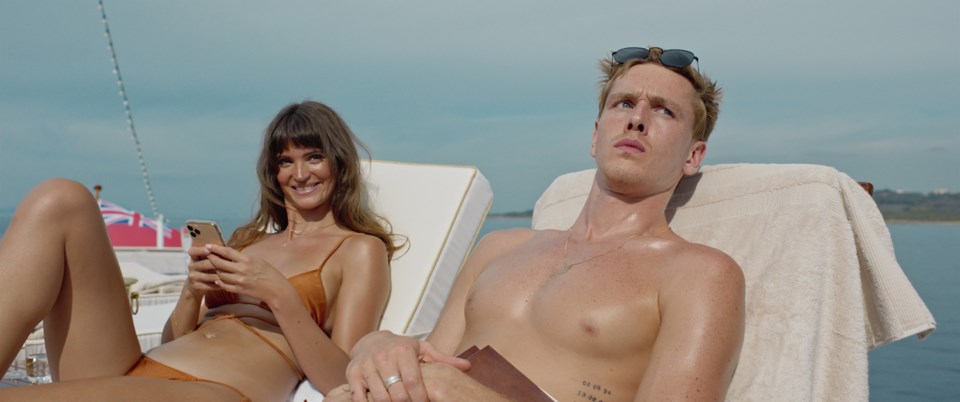The question of worth flows through Ruben ├¢stlundŌĆÖs ŌĆ£ ,ŌĆØ a handsomely grotesque satire about the guests and workers aboard a luxury yacht. The ideas might not be new, and the targets might be easy, but the Swedish filmmaker who has made a cottage industry out of picking at social scabs in films like ŌĆ£Force MajeureŌĆØ and ŌĆ£The SquareŌĆØ has once again made something exceedingly uncomfortable and undeniably entertaining.
Besides, from ŌĆ£SuccessionŌĆØ to ŌĆ£The White Lotus,ŌĆØ itŌĆÖs not like weŌĆÖll ever tire of watching the privileged class enjoying its privileges, to quote ŌĆ£The Philadelphia StoryŌĆÖsŌĆØ Macaulay Connor, regardless of whether they get their comeuppance in the end.
The beauty and pleasure of something like ŌĆ£ ŌĆØ is in the details, like the well-observed and precisely crafted awkwardness over who should pay the restaurant bill, or the rules about who gets to sit in the front row of a fashion show shifting in real time. The ideas about class consciousness arenŌĆÖt anything that a college freshman isnŌĆÖt already well-versed in. But even when the movie starts quoting Marx, itŌĆÖs done with a wink and amid a deluge of bodily fluids. Seasickness really is the great equalizer (consider yourself warned).
The title, ŌĆ£Triangle of Sadness,ŌĆØ ├¢stlund says, is a reference to the wrinkles in between oneŌĆÖs brows that plastic surgeons can fix with a shot of botox. ItŌĆÖs not a phrase IŌĆÖve ever heard ŌĆö worry or frown lines seem to be the common ways to describe that, but, apocryphal or not, itŌĆÖs a good one. Here, our entry into the world of the one percent, are a model couple, Carl (Harris Dickinson) and Yaya (Charlbi Dean, a promising talent who ). Their only currency is their youthful beauty, which is lucrative for now.
After a sharp glimpse inside their public and private world, Carl and Yaya are invited aboard a $250 million yacht for a little vacation among a rarified set. Their ticket is paid for on the hope that Yaya, who is also a social media influencer, will Instagram the experience. The others on board have presumably paid their own way, with riches from big business ŌĆö tech, agriculture and even arms dealing (embodied by the most harmless looking English grandparents youŌĆÖve ever seen).
The crew are reminded that every request should be met with a yes. In this transactional relationship, the hope is that their servitude is rewarded with a big tip. But what happens when a guest requests, then demands, that the entire crew take a break and go swimming on the afternoon when everyone is supposed to be preparing for the big captainŌĆÖs dinner? Well, itŌĆÖs the avalanche scenario of ŌĆ£Force MajeureŌĆØ but with champagne and fine dining. They keep up appearances for a bit. Then itŌĆÖs all vomit, blood and general excreta as Woody HarrelsonŌĆÖs drunk, Marxist captain and a Russian oligarch (a scene-stealing Zlatko Buric) opine on ideologies and quote Noam Chomsky over the loudspeaker.
This could be a natural conclusion to ŌĆ£Triangle of Sadness,ŌĆØ but ├¢stlund, who wrote and directed, still has one chapter to go focused on what happens when several of the guests and crew become stranded on a desert island. There, a character weŌĆÖve barely met, Abigail (a terrific Dolly de Leon), who on the ship was the toilet manager, is the only one who knows how to catch and clean fish and build a fire. In this environment, her skills are the only ones that matter, and a new world order is formed.
The third episode on the island is not lesser than the others, but it does start to overstay its welcome. ŌĆ£Triangle of Sadness,ŌĆØ which clocks in at almost two and a half hours, is at its sharpest before the symphony of bodily fluids and survival plots arrive. ├¢stlund could have probably kept the whole story under two. But maybe the maximalism is part of the point since revolution certainly is not. The film won the earlier this year, a gathering that is not without its own excesses.
Maybe ├¢stlundŌĆÖs thesis was right there at the beginning, on the large screen behind the fashion show: ŌĆ£Cynicism masquerading as optimism.ŌĆØ Again, itŌĆÖs territory that has been covered before, but one only need look at the shenanigans currently happening at Paris Fashion Week to realize that for as hyperbolic as he tried to be, he only scratched the surface.
ŌĆ£Triangle of Sadness,ŌĆØ a NEON release, in limited release Friday, is rated R by the Motion Picture Association for ŌĆ£some sexual content and language.ŌĆØ Running time: 149 minutes. Three and a half stars out of four.
ŌĆö-
MPA Definition of R: Restricted. Under 17 requires accompanying parent or adult guardian.
ŌĆö-
Follow AP Film Writer Lindsey Bahr on Twitter: www.twitter.com/ldbahr.
Lindsey Bahr, The Associated Press




